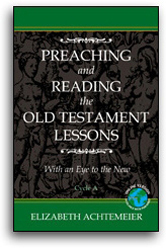SermonStudio
Fifth Sunday of Easter
Preaching
Preaching and Reading the Old Testament Lessons
With an Eye to the New
I got in a religious dispute one time with a relative over particular truths in the Christian gospel, and at one point in the argument, as she became more and more defensive, she blurted out, "Don't quote scripture to me!"


